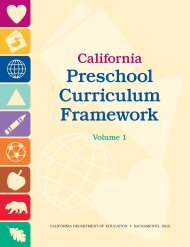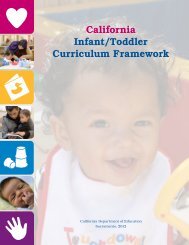California Preschool Learning Foundations - ECEZero2Three ...
California Preschool Learning Foundations - ECEZero2Three ...
California Preschool Learning Foundations - ECEZero2Three ...
You also want an ePaper? Increase the reach of your titles
YUMPU automatically turns print PDFs into web optimized ePapers that Google loves.
types of cognitive processing and<br />
problem solving that characterize<br />
comprehension in the elementary<br />
grades, with strategies such as<br />
self-questioning and use of mental<br />
imagery (Bauman and Bergeron 1993;<br />
Fitzgerald and Spiegel 1983). Shared<br />
reading activities also help children<br />
become familiar with the nature of<br />
written language and help preschool<br />
children realize the developmental<br />
progression from an “oral” to a<br />
“written” type of language (Purcell-<br />
Gates 1988; Sulzby 1985).<br />
Children entering school from disadvantaged<br />
environments often have<br />
limited or minimal exposure to complex<br />
narrative texts. Shared reading,<br />
picture-book reading, and the instructional<br />
conversations are of special<br />
relevance for these children. The lack<br />
of exposure puts them at a disadvantage<br />
when they are placed in classrooms<br />
with students who have been<br />
repeatedly exposed to the language,<br />
ideas, routines, and pleasures associated<br />
with complex text (Baker, Serpell,<br />
and Sonnenschein 1995; Dahl and<br />
Freppon 1991; Marvin and Mirenda<br />
1993; Preventing Reading Difficulties<br />
in Young Children 1998; Purcell-Gates<br />
and Dahl 1991). Fortunately, this<br />
exposure gap can be closed through<br />
instruction at home and in school<br />
(Clay 1979; Leppäen and others 2004;<br />
Purcell-Gates, McIntyre, and Freppon<br />
1995). For example, adults can<br />
explicitly engage children with thinking<br />
about and responding to specific<br />
elements of texts during storybook<br />
reading interactions. They might,<br />
for instance, focus a child’s attention<br />
on following the cause-and-effect<br />
sequence of a story or discussing<br />
words that occur repeatedly in a text<br />
to create coherence. It is most impor-<br />
<strong>California</strong> Department of Education • <strong>Preschool</strong> <strong>Learning</strong> <strong>Foundations</strong>, Volume 1<br />
85<br />
tant that adults who read with young<br />
children provide this structure<br />
consistently and systematically, so<br />
that they support children’s engagement<br />
with certain aspects of the text<br />
(e.g., causal flow of events) that children<br />
may not be drawn to incidentally<br />
or of their own accord (Ezell and<br />
Justice 2000).<br />
Literacy Interest and Response.<br />
The comprehension of text for young<br />
children requires both skill and will,<br />
will usually being a precursor to skill.<br />
Showing an interest in books and<br />
holding a positive regard for reading<br />
are considered developmental<br />
accomplishments of three- and fouryear-olds<br />
by the National Research<br />
Council (Preventing Reading Difficulties<br />
in Young Children 1998). Children’s<br />
willing participation in such literacy<br />
activities as handling books and listening<br />
to stories is an essential precursor<br />
to their later cognitive engagement<br />
with text, in the same way that early<br />
joint attention between a caregiver and<br />
a child is an essential precursor to<br />
achievements in oral language production<br />
and comprehension. Early interest<br />
in literacy may also motivate children<br />
to persist with future challenging reading<br />
tasks (Preventing Reading Difficulties<br />
in Young Children 1998). Cognitive<br />
skills are necessary for children to<br />
become able readers, but to become<br />
lifelong literacy learners, children<br />
must be motivated to engage in literacy<br />
activities and persist in their engagement.<br />
As such, interest in literacy is<br />
closely linked to the issue of motivation.<br />
Interest in and motivation toward<br />
reading describe the child’s affect<br />
toward, or feelings about, literacy<br />
activities (Alexander and Filler 1976;<br />
Mathewson 1994; McKenna, Kear,<br />
LANGUAGE AND LITERACY
















